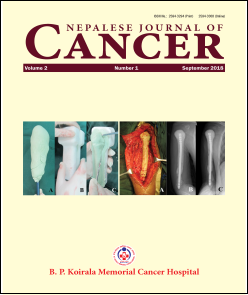Leukaemia with pregnancy managed at B. P. Koirala Memorial Cancer Hospital
DOI:
https://doi.org/10.3126/njc.v2i1.25661Keywords:
Chemotherapy, Leukaemia, PregnancyAbstract
Abstract: Leukaemia during pregnancy is rare, occurring approximately one in every 75,000 to 100,000 pregnancies annually. Chemotherapeutic agents may have harmful effects to the developing baby though leukaemia itself rarely harms the baby. There is no evidence that pregnancy accelerates the progression of disease or affects the outcome. However, treatment dilemmas often occur.
Aims: To study the clinical presentation, treatment and outcome of leukaemia with pregnancy managed at B. P. Koirala Memorial Cancer Hospital (BPKMCH).
Methods: Descriptive study was conducted at BPKMCH. Case records of women with cancer and pregnancy from January 2006 to February 2013 were analyzed regarding their clinical details, treatment, follow-up and feto-maternal outcome.
Results: Six women, of 20 to 28 years had leukaemia with pregnancy among which four were chronic myeloid leukaemia (CML), one was acute lymphocytic leukaemia (ALL) and acute myeloid leukaemia (AML) each. All four cases of CML had conceived while on oral Imatinib; the three case diagnosed in the first trimester opted for immediate termination of pregnancy while the fourth one diagnosed at 22 weeks of pregnancy continued pregnancy and delivered at 34 weeks by emergency caesarean section for severe oligohydramnios. The ALL case diagnosed at 26 weeks of pregnancy wanted termination of pregnancy and immediate induction chemotherapy. The AML case diagnosed at 32 weeks of pregnancy desired to undergo induction chemotherapy with pregnancy but she defaulted treatment and had intrauterine fetal death and died due to postpartum haemorrhage. The baby, delivered to a mother exposed to Imatinib throughout pregnancy, till date has normal growth and development. Five mothers are in remission.
Conclusions: Leukaemia with pregnancy, more common in younger women is rare and posed treatment challenges. Definitive treatment should be individualized according to the desire of the pregnant woman and should include a multi- disciplinary team. Termination of pregnancy in favour of definitive chemotherapy to mother is better and easier during the first trimester of pregnancy. Because of teratogenic effects of chemotherapy, effective contraception be used during therapy to prevent pregnancy.
Downloads
Downloads
Published
How to Cite
Issue
Section
License
This license lets others distribute, remix, tweak, and build upon your work, even commercially, as long as NJC and the authors are acknowledged.
Submission of the manuscript means that the authors agree to assign exclusive copyright to NJC. The aim of NJC is to increase the visibility and ease of use of open access scientific and scholarly articles thereby promoting their increased usage and impact.




